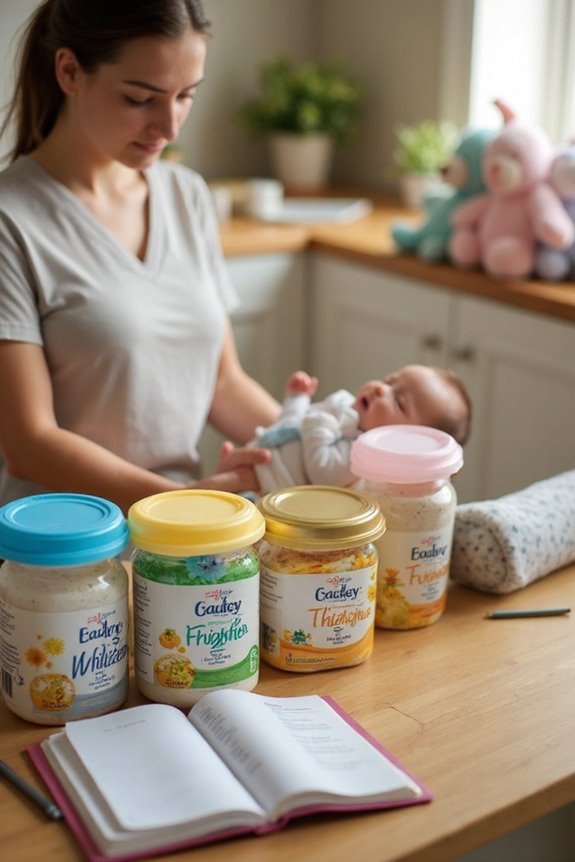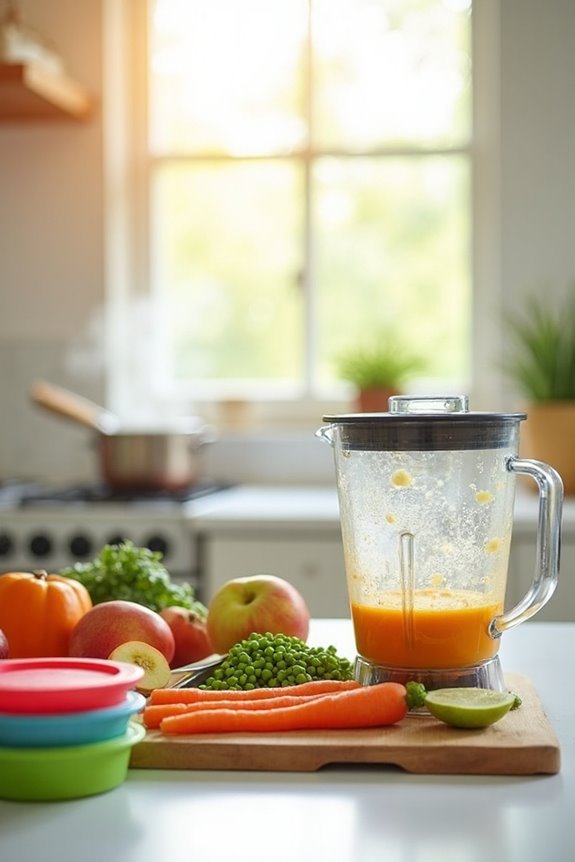Choosing the best baby formula feels overwhelming, but we’ve got you covered. Consider cow’s milk-based formulas for a reliable choice enriched with nutrients. Soy-based options cater to vegetarians, while organic formulas like Bobbie offer reduced chemical exposure. Safety is key, so ensure formulas meet FDA standards and watch for allergens. Start with 1-2 ounces per feed for newborns. These practical tips set you on a path to finding the perfect formula for your baby’s needs. Discover more insights ahead.
Key Takeaways
- Choose cow’s milk-based formulas for a reliable source of essential nutrients and lactose for many infants.
- Consider soy-based formulas for vegetarian infants needing plant-based protein and nutrition without dairy.
- Opt for iron-fortified formulas to meet critical nutritional requirements for infant development.
- Ensure the formula meets FDA safety standards for nutrients, contamination, and packaging.
- Consult healthcare professionals to personalize formula choices based on allergies, intolerances, and nutritional needs.
Types of Baby Formulas
Let’s dive into the world of baby formulas, where choosing the right one can feel like a big decision. We know you want the best for your little one, and understanding the types of formulas can help. Most parents start with cow’s milk-based formulas, which are enriched with lactose and essential nutrients. They’re often a reliable choice for many infants. But, if you’re raising a vegetarian or have concerns about cow’s milk allergies, soy-based formulas are a great alternative. They offer a plant-based protein that supports nutrition without dairy.
- Cow’s Milk-Based: Common, with added nutrients.
- Soy-Based: Ideal for vegetarians or dairy-sensitive babies.
Exploring these options ensures your baby gets the nourishment they need.
Key Considerations for Choosing a Formula

When it comes to choosing the right baby formula, understanding the key considerations can help guide you through this important decision. Our formula preferences often hinge on achieving a nutritional balance that supports our baby’s growth. Here’s what we need to consider:
- Nutritional Requirements: Look for iron-fortified options, as iron is crucial for development. Ensure the formula provides essential nutrients, including proteins, carbohydrates, fats, vitamins, and minerals.
- Safety and Regulation: Trust brands inspected by the FDA for safety and nutritional standards. Check expiration dates and avoid damaged containers.
- Allergies and Intolerances: Select formulas based on your baby’s needs. Cow’s milk-based is typical, but soy or hypoallergenic options exist for specific conditions.
- Preparation and Feeding: Follow water ratio instructions and storage guidelines to ensure safety and effectiveness.
Organic Baby Formula Options

Choosing the best organic baby formula can feel daunting, but understanding your options makes it easier. Let’s explore the organic formula benefits and compare brands. Organic formulas reduce your baby’s chemical exposure by avoiding pesticides and antibiotics. They often use grass-fed milk, which aids digestion, and lactose as a natural sweetener. Many include whey protein and prebiotics for gut health.
When comparing organic brands, consider these:
- Bobbie Organic Infant Formula: Offers grass-fed milk and whey protein.
- Baby’s Only Organic: Budget-friendly with quality ingredients.
- HiPP and Holle: European brands with strict standards.
- Happy Baby: Known for lactose sweetening and prebiotics.
Each choice supports your baby’s health uniquely, so pick what best suits your family’s needs.
Ensuring Formula Safety and Quality

As we consider the best organic baby formula for our little ones, it’s equally important to focus on ensuring the formula’s safety and quality. The FDA oversees formula testing and ingredient sourcing to safeguard our children’s health. Here’s what we need to know:
- FDA Oversight: Manufacturers must adhere to strict safety standards, ensuring water and ingredients meet EPA guidelines.
- Nutrient Requirements: Formulas need a precise balance of at least 30 nutrients, with specific vitamin and mineral levels.
- Testing and Inspections: Finished products undergo rigorous testing for contamination and compliance, including checks for harmful chemicals like arsenic and lead.
- Packaging Safety: FDA evaluates packaging materials to prevent exposure to unsafe substances.
Understanding these measures helps us make informed decisions, providing peace of mind as we nourish our babies.
Tips for Parents on Formula Feeding

Feeding our babies with formula can be a rewarding journey when we understand the basics and follow some helpful tips. Recognizing feeding schedules and hunger cues is essential. Let’s explore how we can make this experience smoother:
- Feeding Schedules: Newborns typically need 8-12 feedings a day. As they grow, their stomachs can handle more, allowing longer intervals.
- Hunger Cues: Look for signs like sucking on fists or rooting. If your baby seems hungry after a feed, they might need more formula.
- Meal Sizes: Start with 1-2 ounces per feed, gradually increasing to 3-4 ounces by the first month’s end.
- Consultation: Always consult a healthcare professional for personalized advice. Our journey becomes easier with the right guidance.
Frequently Asked Questions
What Are the Environmental Impacts of Formula Production?
You can’t have your cake and eat it too. Formula production significantly impacts our environment. We must adopt sustainability practices to reduce its carbon footprint, addressing energy use, water consumption, and transitioning to renewable resources for a healthier planet.
How Does Formula Feeding Affect Bonding With My Baby?
We’re exploring how formula feeding affects bonding with our baby. Formula feeding offers bonding benefits through shared feeding techniques, allowing both of us to connect deeply with warmth, eye contact, and sensitive care, nurturing a strong emotional bond.
Are There Any Plant-Based Formula Options Available?
Let’s dive into the garden of plant-based options, offering a bounty of nutritional benefits. They’re like a gentle embrace for our little ones, providing essential nutrients while being dairy-free and kinder to our precious planet.
How Can I Reduce the Cost of Formula Feeding?
We know formula feeding can be costly, but let’s save together. Consider bulk purchasing and opting for store brands. They meet the same nutritional standards as name brands, and buying in bulk can significantly reduce expenses.
What Are the Common Myths About Formula Feeding?
Did you know 60% of parents use formula? Let’s tackle myths: formula safety is ensured by strict regulations, and there’re great formula alternatives. We’re here to support your choices, ensuring your baby’s well-being and happiness.





